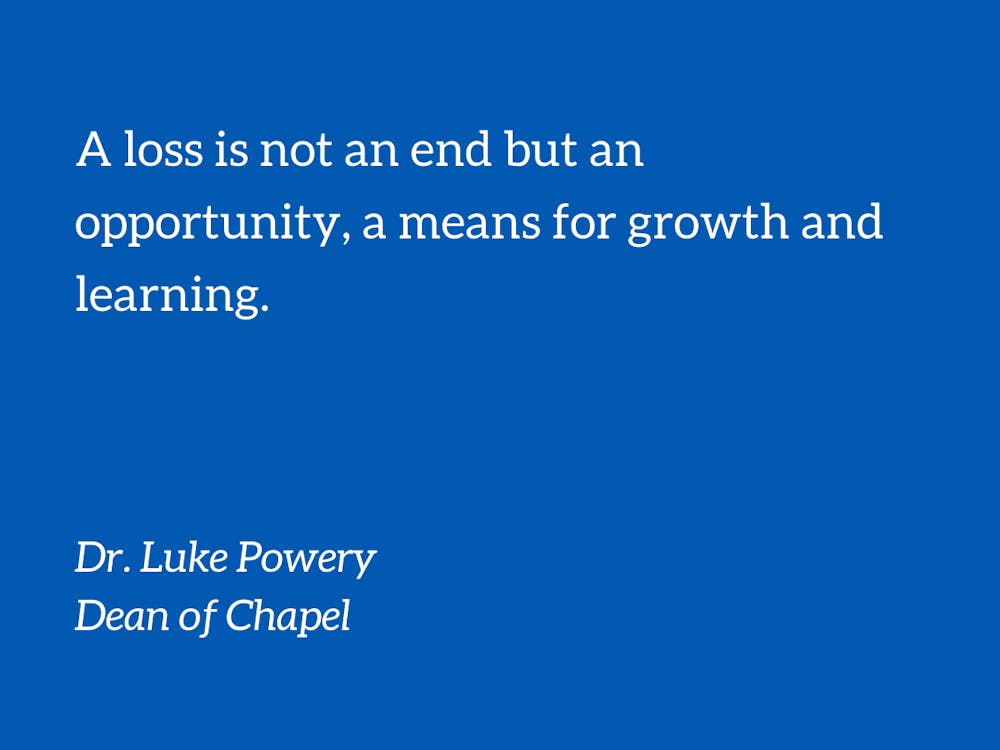Duke University is a top-level research and educational institution that aims to integrate a high level of academics with excellence in athletics. If you were paying attention at all recently, you would know the important role Duke men’s basketball plays at this university, especially during the 42-year tenure of Coach K. And now we are headed into March Madness, Even I know that, for some, the number one religious building on campus is not Duke Chapel; it’s Cameron Indoor Stadium.
What I’ve observed here at Duke and through participation in sports back in the day is that there are spiritual lessons and insights gained by playing a sport. And so, I want to highlight some of the ways sports can illuminate the nature of a spiritual life.
First, and probably most obviously, most sports require teams. Basketball, baseball, volleyball, football, lacrosse—they are not solo virtuoso acts. As the saying goes, there is no ‘i’ in ‘team.’ And so it is in the spiritual life as well—we need a team to surround us, a community to love us, a group to cheer us on in life. We need others to hold us accountable when we aren’t doing as we should. We need to support each other and care for one another and rejoice when others succeed, even if we are not in the spotlight. We need a strong community on and off the field, a real team that is about “we” not “me.” As on the sports field, clear and open communication are critical for succeeding and growing as a team and in the spiritual life together. Thus, who is on your team matters for your ongoing development.
Second, playing a sport requires the discipline of practice. Early morning workouts. The daily grind of repetitive drills. Striving to increase strength and agility while also better understanding the plays. It takes discipline and practice to improve. Across religious traditions also, people practice spiritual disciplines like prayer or meditation or reading sacred texts to grow and become centered. People practice who or what they desire to become.
Third, in sports there will be wins and losses. It is rare that teams have undefeated seasons and don’t go through some sort of struggle. To grow as a team, how you respond to losses is just as important as how you celebrate the wins. In the spiritual life, there are ups and downs too, joys and sorrows. If one suffers a loss, one still keeps going, just as teams have to continue to show up on the field even if they are on a losing streak. A loss is not an end but an opportunity, a means for growth and learning. Setbacks are just setups for comebacks. Navigating wins and losses, ups and downs, calls for courage, humility, determination and perseverance.
Fourth and final, you will never be perfect. Top-notch athletes strike out or miss layups. Imperfection is par for the sports world as well as the spiritual life. And it is a reminder that we aren’t called to be perfect but faithful to whatever task that is before us. This means doing what we know to do in order to develop and grow as a player and a person. Athletes make fouls and even foul out of games. They mess up. This happens in the spiritual life too—we make mistakes or missteps—but we keep going and trying and learning from them.
Any of Duke’s coaches can tell you about how student-athletes are formed as people through participation in competitive sports. But it’s not a quick fix; it’s a journey. The same is true of the spiritual life. We are running a marathon, not a sprint. Patience is a virtue. As the Bible’s Letter to the Hebrews puts it: we “run with perseverance the race that is set before us.”
The Rev. Dr. Luke A. Powery is Dean of Duke University Chapel. His column runs on alternate Mondays.
Get The Chronicle straight to your inbox
Signup for our weekly newsletter. Cancel at any time.

